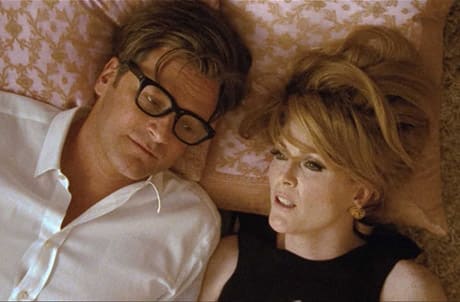When designer Tom Ford left the house of Gucci some years ago, he dropped off the public radar (apart from nuzzling a naked Keira Knightley and Scarlett Johansson on the cover of Vanity Fair). No one would have guessed he'd resurface as the writer/producer/director of A Single Man, based on Christopher Isherwood's novel, and no one seems to find it an odd or surprising career change. Then again, if film star Hilary Duff can launch her own fashion designs, why can't a fashion designer direct a film?
Set during the span of one day in 1962, the film follows professor George Falconer (Firth) mourning the loss of his partner (Goode) while going through the motions of the day: dressing, not answering the phone, lecturing at the university and engaging in pleasantries, all with a pistol in his briefcase and a carefully planned demise. However, the eagerness of devoted student Kenny, played by Nicholas Hoult (About A Boy, Skins), throws a spanner into Falconer's carefully devised works.
It must be said that Ford's directorial style is comparable to his haute couture: sleek, classic, precise, functional and meaningfully potent. He has a fascination with slow motion close-ups, but most noticeably, colour. The use of stark fades and warm washes contrast with Falconer's passion and rage as well as his solitude and sadness. This, coupled with the depiction of the marginalization of homosexuals in the American south of the '60s, is all a very deliberate device for allusion and allegory. The result is a highly stylized visual piece ― pink cigarettes, outrageous bouffant hairdos, and copious amounts of black eyeliner. Even the manner in which a clock ticks or an eye blinks is emphasized.
Colin Firth carries the film quite deftly with subtlety and an ardent longing, maintaining a mannered demeanour that is only broken by Julianne Moore's joie-de-vivre and Hoult's innuendos. Although having the American actor doff a British accent and the British actor an American one is somewhat jarring.
This quiet film doesn't seek to be a grandiose spectacle but will surely find a wide audience. It is an impressive debut.
(Alliance)Set during the span of one day in 1962, the film follows professor George Falconer (Firth) mourning the loss of his partner (Goode) while going through the motions of the day: dressing, not answering the phone, lecturing at the university and engaging in pleasantries, all with a pistol in his briefcase and a carefully planned demise. However, the eagerness of devoted student Kenny, played by Nicholas Hoult (About A Boy, Skins), throws a spanner into Falconer's carefully devised works.
It must be said that Ford's directorial style is comparable to his haute couture: sleek, classic, precise, functional and meaningfully potent. He has a fascination with slow motion close-ups, but most noticeably, colour. The use of stark fades and warm washes contrast with Falconer's passion and rage as well as his solitude and sadness. This, coupled with the depiction of the marginalization of homosexuals in the American south of the '60s, is all a very deliberate device for allusion and allegory. The result is a highly stylized visual piece ― pink cigarettes, outrageous bouffant hairdos, and copious amounts of black eyeliner. Even the manner in which a clock ticks or an eye blinks is emphasized.
Colin Firth carries the film quite deftly with subtlety and an ardent longing, maintaining a mannered demeanour that is only broken by Julianne Moore's joie-de-vivre and Hoult's innuendos. Although having the American actor doff a British accent and the British actor an American one is somewhat jarring.
This quiet film doesn't seek to be a grandiose spectacle but will surely find a wide audience. It is an impressive debut.
